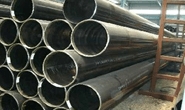Government/Policy

July 17, 2018
Texas Pipemaker Denied Exemption, Putting Expansion at Risk
Written by Sandy Williams
Houston-based pipe manufacturer Borusan Mannesmann Pipe U.S. has been denied a temporary exemption from Section 232 tariffs on steel imports.
Borusan was one of the first companies to file for product exemptions. After not getting a response, Joel Johnson, Borusan Mannesmann’s U.S CEO, decided to take a more direct approach and initiated a company postcard campaign appealing directly to the president and members of Congress. Johnson and Borusan workers penned letters to Washington, as well as the governor of Texas, requesting a two-year exemption in order to expand its Baytown, Texas, operations.
The company is prepared to invest in a $75 million expansion at Baytown and asked Commerce for a two-year exemption in order to get the facility built and operational. The proposed expansion would allow Borusan to end its steel imports from its parent company in Turkey and use only U.S.-manufactured steel. In June, Johnson told the Houston Business Journal that the company just needs a little breathing room while completing the project.
Johnson said tariffs have already cost the company about $2.5 million since they went into effect. Without an exemption, annual costs for the company are expected to be in the range of $25 million to $35 million, which would likely result in layoffs instead of the new hires expected from the expansion.
The denial Borusan received on July 6 was a form letter dated June 19, prior to the postcard campaign and the company’s national media blitz in support of the exemption.
In a comment to SMU, Johnson said, “Our company and our dedicated employees are very disappointed that the government did not accept our unique short-term application for a 232 steel tariff exemption in exchange for a significant financial investment and expansion in our Baytown, Texas, facility that would have created about 170 new well-paying jobs in the critical energy sector. At this time, we are reviewing all of our options.”
Objections to Borusan’s exemption came from the company’s pipe-making competitors who don’t want to see another factory in the area, said Johnson in an interview with Houston Matters. Domestic steel producers that Borusan buys from, like Nucor, SDI and Big River, didn’t file objections.
In his interview with Houston Matters, Johnson said the company will re-file. “We are giving President Trump what he wants, which is more domestic steel, more jobs, and more investment and stopping imports. We would stop importing [from our parent company in Turkey], but we need another factory to do that.”







